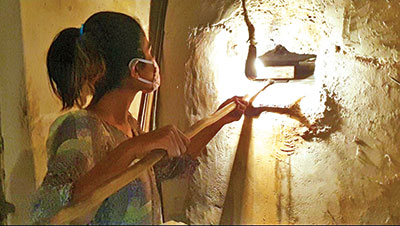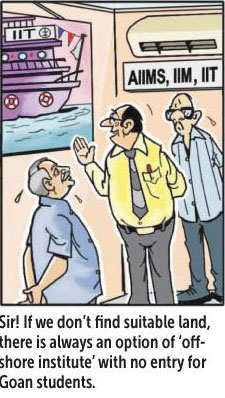
Unless you have been living under a rock for the past few months, you are probably aware that the world is going through a pandemic, the likes of which we have never seen before. And Goa is no different. Although the numbers of ill and dying are low, Goan industry and tourism has suffered like their counterparts across the world. Undoubtedly, the first half (?) of 2020 will go down in history books as one of the most devastating events for people, planet and economy. But like some psychologists rightly point out, crises also offer us the opportunity to hit the reset button and create a whole new societal framework post crisis. Which means that we need to sit down and take a long, hard look at the kind of society and economy we in Goa want to have post-COVID.
Despite the doom and gloom that it is causing all across the world, there are a few “bright sides” (if one may call them that!) to this terrible pandemic. By forcing people to (largely) stay and work from home as well as by bringing the economy to a near standstill, COVID-19 offers us the once-in-a-lifetime opportunity of both time and means to re-evaluate what we would like our future to look like, post-COVID.
Let us begin with the
economy
Goa, unfortunately, has been known in the past as a party and casino destination. Hordes of tourists descend on the state to either party like there is no tomorrow at festivals such as the EDM ones or gamble away late into the night at one of the numerous offshore casinos on the Mandovi. While the morals of either are debatable, from a tourism perspective such tourism is not ideal since it isn’t sustainable. Tourism in Goa currently only benefits a few businessmen (and employees to a far lesser extent). For tourism to be truly sustainable in the long term, it must benefit all sections of society financially, socially and ecologically.
Which brings me to my
second point: Goan society
On a call today with my good friend Armando Gonsalves (of Goa ForGiving fame), we got to talking about the role of certain sections of society. And I was indeed shocked to hear from him that the term Poder (or baker in Konkani) was once used as a derogatory term to refer to a not so bright a person. As was the term Goenchopao (or Goan bread) e.g. Goans in Bombay were derided by calling them Goencho Pao, something that was not a very happy thing to hear for a Goan. Apart from the fact that the term is discriminatory, what does it say about us as a society if we criticize those who work hard and honestly for a living? Not everyone can be a lawyer or doctor or work on the ships. Is there anything wrong in doing something as valuable as producing food (bread) for a society, and doing so with love and joy for one’s handiwork? The same principle applies to other professions that we tend to look down on, such as farmers, toddy tappers, fishermen etc.
What Goan society needs is a paradigm shift in the way we think of and respect professions that are seemingly worth less than others. Armando, marketing genius that he is, came up with the hashtag #ProudToBePoder to refer to his wife Shaeen and the wonderful work she is doing upkeeping her family’s profession of baking. Shaeen recently came up with a line of profiteroles that were widely praised by those who ordered from her. And one look at the pictures on Facebook make one’s mouth water. Not satisfied with a great product, she also came up with a great branding and design, transforming a seemingly simple product into a designer item that Armando plans to sell alongside organic fruits from his garden and fresh fish caught by a friend at a special store in Fontainhas, the heritage Latin Quarter of Goa (home to my family’s 450 year old Portuguese bungalow that we restored and transformed into a boutique hotel) and increasingly popular with cultural tourists.
Thankfully, Shaeen is not alone in her quest to make Goans proud of their traditional occupations. John Desa, a Goan based in Qatar for over 30 years, opened up a fish store in Cortalim two years ago. Coming from a long family of “Kharvi” (or fishermen), he was always keen on following his forefathers. And it took the COVID crisis and the subsequent lockdown for his business to really take off, as he started delivering fish to the doorsteps of people across Goa while using the hashtag #ProudToBeKharvi. Rama Kankonkar, Nestor Rangel and Mario Braganca have all returned to their traditional profession of farming by cultivating their ancestral farm land. Mario also conducts workshops for school kids, teaching them the importance of growing food (something that the children of today desperately need to learn!). Such examples serve to inspire a generation of Goans in taking up to home farming on the land that so many have around their homes.
Creating awareness of such wonderful initiatives is key, not just among the locals but among the tourists as well, both Indian and foreign alike. Only if marketed properly will tourists be aware of and visit these entrepreneurs, taking part in guided tours, workshops etc. which contribute directly to the local economy and reduce income leakages that take place when the main actors to profit from tourism are the big firms rather than the local people.
#ProudToBePoder provides a perfect example of how tourism, food and Goan identity can be combined to lead the way forward for a post-COVID Goa. As seen above, we need to work together to achieve this. Firstly, we must make it more respectable to pursue traditional Goan professions. Especially considering the number of people who will be returning to Goa from the Gulf and the West as a result of mass layoffs thanks to COVID, Goans must be encouraged to take up the professions of their forefathers, not just because it is part of their heritage but also because it will provide a viable means of providing (financially and socially) meaningful employment to a large number of people in Goa. Secondly, we need to help people from these professions market their products to not just locals but tourists as well, such that these products no longer remain undervalued and underrated commodities but designer items, experiences even, that are cherished by those who buy them. Why should tourists head straight to the beach or the casino upon landing in Goa? Instead, tourists need to be encouraged to discover, visit and learn more about traditional Goan professions that are otherwise in danger of dying out. Packaged and marketed properly, they can become interesting and unique alternatives to the beach and casino tourism that Goa has been inundated with in the past. Tourism in Goa thus needs to be redefined by moving away from the dependence on party and casino tourism, to sustainable tourism that benefits the many, not just the few. Only then can we hit the reset button with confidence, strong in the belief that Goa’s post-COVID future will be a bright and promising one!
(Prof. Dr. Mihir Nayak is a Professor for Hotel and Tourism Management at a renowned private University in Cologne, Germany. Despite having left India at a young age, he remains true to his Goan roots and heritage.)
